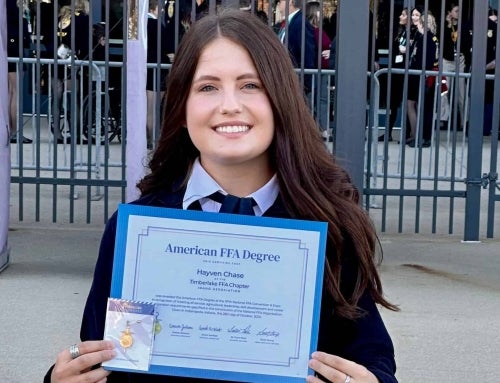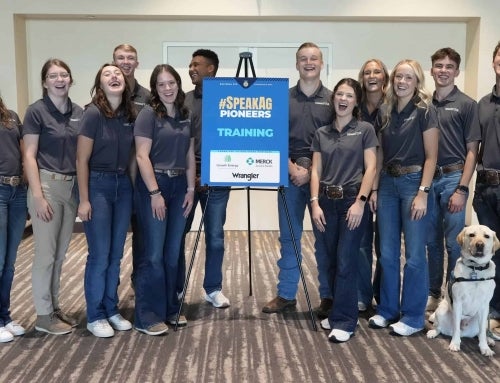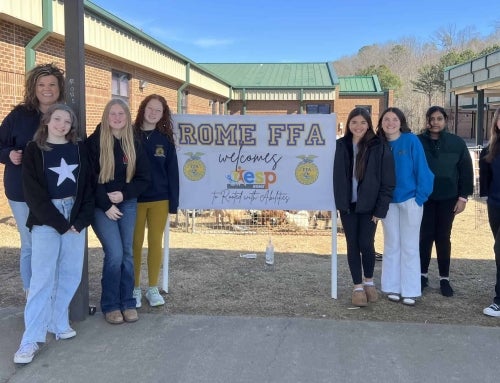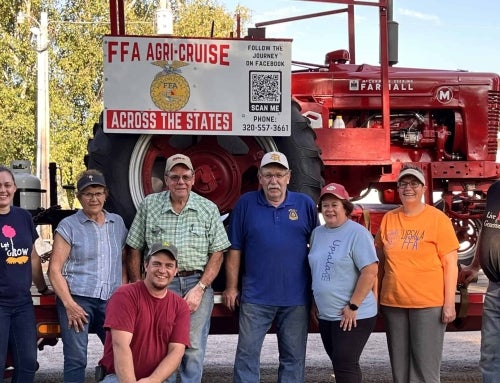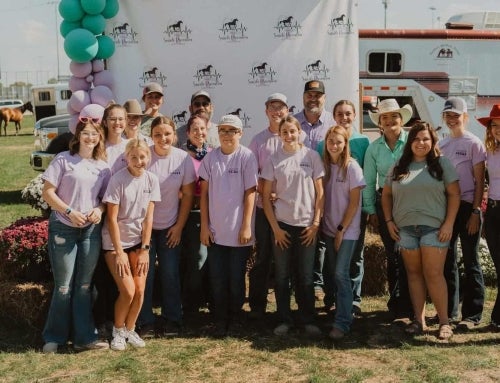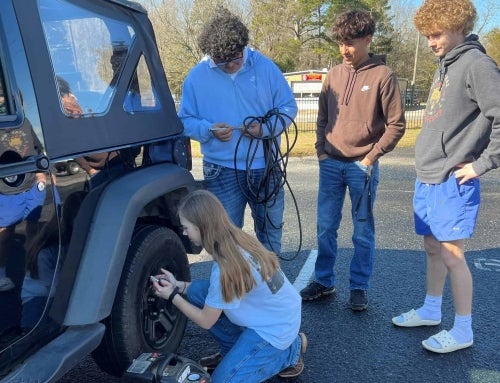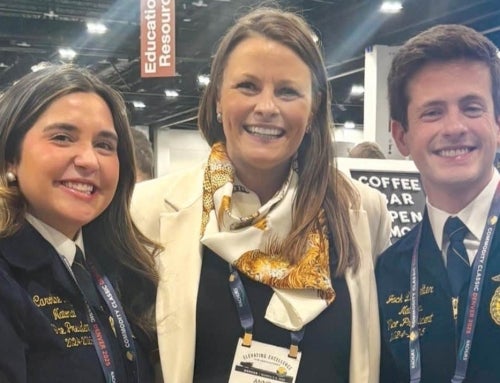The college students who make up the University of Arkansas Collegiate FFA Chapter are passionate about paying it forward.
Most of these students wore the blue jacket in high school. Now in college, they give back by mentoring FFA members through workshops and by judging both state and national career and leadership development events.
Theirs is just one of many collegiate success stories, and the National FFA Organization hopes even more college-age students and local volunteers become involved, regardless of whether they were members in high school or not. In fact, the National FFA Alumni Association was recently renamed the National FFA Alumni and Supporters to reflect this broad reality.
“FFA Alumni membership has been open to anyone who supports agriculture since shortly after its beginning in 1971, but the name hasn’t really reflected that,” says Joshua Rusk, executive director of National FFA Alumni and Supporters. “The organization has been struggling with it for decades because it’s not clear that we’re a very inclusive organization. You don’t have to be a former FFA member to be active with FFA as an adult.”
Colleges, Take Note
Delegates at last year’s national convention voted to remove the Collegiate FFA membership form and move those members into the new National FFA Alumni and Supporters.
“I think a huge advantage here is that there won’t be a barrier,” Rusk says. “It opens the eyes of individuals to see the inclusiveness and to know that anyone interested in supporting the organization can join.”
Under the realigned format, any college, university or tech school can charter its own National FFA Alumni and Supporters Chapter. Current collegiate chapters will convert to the new format beginning with the 2018-19 FFA membership year.
Hailey Gates, graduate advisor of the University of Arkansas FFA, has been overseeing the 25-member chapter for the last two years. She also hopes more college students charter new chapters and take advantage of alumni and supporter activities.
“National FFA Alumni and Supporters is an awesome opportunity to take a closer look at agricultural education and to be a part of something bigger than yourself, which is something college students really crave,” Gates says. “It’s also a great networking opportunity and provides an opportunity to grow FFA advocacy. I think that will only continue to grow as more students who might not have been in FFA continue to join.”
The University of Arkansas FFA was also one of the first collegiate chapters to receive an FFA Alumni Legacy Grant through the National FFA Organization, which helped fund opportunities for college students to travel to judge FFA events at both the local and national levels.
“The opportunities for college students to stay involved are out there,” Gates says. “I think it’s great when students see the organization from another perspective as they become passionate about their own individual careers.”
Members of the Virginia Tech Collegiate FFA Chapter are also strong believers in helping the next generation. With about 20 active members, including a few who were not previous FFA members, community outreach and mentoring are things the chapter focuses on heavily.
“Being involved at the collegiate level allows us to go beyond our campus borders and reach people outside of our college network and to help them achieve,” says Virginia Tech student advisor Chandler Vaughan. “It gives us a way to impact the lives of others through something that we’re all passionate about.”
The chapter recently partnered with a local high school to help it implement an aquaponics system, something that Vaughan said was an educational experience for both the college students and the high school.
“We know the importance of those hands-on activities,” Vaughan says. “It gives college students an opportunity to see agricultural education from another perspective, and it gives the high school students the opportunity to see how they can stay involved with FFA after high school.”
The Virginia Tech chapter also does its fair share of judging career and leadership development events. It also has a jacket scholarship program, where the chapter sponsors five FFA jackets every year for local students.
FFA for Everyone
We hope this realignment conveys exactly what the name says,” Rusk said. “This is for anyone who supports agricultural education, FFA and the field of agriculture.”
The former name often carried a stigma, Rusk adds, which deterred college students from joining collegiate chapters if they weren’t former FFA members.
“There are plenty of students who never had the opportunity to be in FFA but want to get involved somehow later in life, and this is the perfect opportunity,” Rusk says. “We also see parents who want to be involved and support FFA, but they feel like they can’t because they are not former FFA members themselves. We hope this new name and format cure that.”
The change in membership format also comes with a few other slight changes, including replacing the alumni emblem with the traditional FFA emblem. Rusk hopes the changes help align FFA Alumni and Supporters more closely to the mission and vision of FFA.
“I think more people will look at this as all one organization now,” Rusk says. “FFA doesn’t stop at the end of high school when you take off the jacket; there is another step you can be a part of. Yes, FFA is something you can start in seventh grade, but it’s a lifelong organization, and this is the perfect way to start that lifelong commitment.”
How to Charter an FFA Alumni and Supporters Chapter
Looking for a way to grow your involvement with FFA after high school? Consider starting an FFA Alumni and Supporters chapter. Follow these requirements to charter or reactivate a local chapter.
- Have at least 10 annual/life alumni members at the state and national levels (if applicable).
- Have a constitution and bylaws that align with the National FFA Bylaws.
- Have a council of elected officers.
- Complete the Application for Alumni and Supporters Chapter Chartering/Reactivating.
- Submit the completed application to your State FFA Alumni and Supporters Association.
- Once the state has completed the process, you will have 30 days to submit your initial roster using the Manage My FFA tool on FFA.org. Your membership dues invoice will need to be paid within 30 days of your membership submission.
- After your dues have been paid, you can apply to be a part of the National FFA 501(c)(3) status.
- To learn more, visit FFA.org/alumni.




